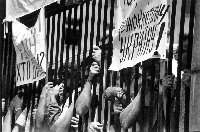Europe Expects Change in Ukraine.After October

The deferment cost our parliamentary delegation sweat and blood. It had a far from easy task: to convince PACE that Ukraine will do in six months what it failed to do during its previous three and a half years of membership. When in November 1995 the Ukrainian delegation led by Yevhen Marchuk signed the document on Ukraine's membership in the council and the Justice Minister was headed by Serhiy Holovaty doubts over whether Kyiv had really chosen a European path of development were few. Obviously, CE lawmakers must have decided to meet Ukraine halfway for several reasons. First, in spite of sometimes harsh criticism of Kyiv, the Council of Europe still has a glimmer of hope that Ukraine will make more or less noticeable progress on the road to Europe. Come what may, Europe is interested in only a European Ukraine. A Belarus-like scenario provokes fear and loathing there. Secondly, to leave Ukraine outside Europe during this complicated election campaign would be cruel to our state and not very safe for Europe itself. A firm stand would have cost dearly in this case: Strasbourg Solons spoke of an East-West gray area, which would have emerged if the Ukrainian delegation had been suspended.
"We understand it is not easy for new Council of Europe member states to fulfill their obligations. It takes time to reform their legislation. Mentality also has to be changed," PACE coordinator Bruno Haller told The Day. At the same time, it is clear the Council of Europe is losing patience with Ukraine, and January we will face our last test of being European. Ukraine was granted the extension primarily because Europe's lawmakers hope that a new Ukrainian President could come to power and carry out tangible democratic reforms. And then we would meet not only such minimum demands as abolishing capital punishment de jure and adopting the Charter on Regional Languages and the Protection of National Minorities. Europe hopes that along with a new leader Ukraine will have freedom of the press and that the observance of human rights will exist not just on paper.
INCIDENTALLY
Serhiy HOLOVATY, chairman of the Ukrainian Legal Foundation, People's Deputy, Member of the Ukrainian parliamentary delegation in the Council of Europe, told The Day, "The Ukrainian question was discussed in a very difficult atmosphere. Tunne Kelam and Hanne Severinsen, who read the main report, took a hard line. In principle, speakers should communicate with the delegation, trying to find a common language with it. But Kelam only arrived on Wednesday at the session, which had started on Monday, i.e., just in time for hearing the Ukrainian question. He in fact made practically no contact with the Ukrainian delegates. This may have been his tactic. But in the absence of Kelam, Severinsen must have felt it her moral duty to be strict.
"We harbored a suspicion that the suspension of the Ukrainian delegation's powers might have been used for actions against Parliament and become a trump for unconstitutional decisions. First, Leonid Kuchma has said he will dissolve Parliament if reelected President. Secondly, Mr. Kuchma considers it his gravest mistake to have allowed Parliament to adopt the Constitution. He is clearly interested in a weak Parliament. Thirdly, the Ukrainian President once incautiously said that the Council of Europe and we might as well go our separate ways. Meanwhile, Parliament has made certain progress on the issues the Council of Europe demands be solved. We have approved the law on courts in the first reading, passed a human rights declaration, and referred to the Constitutional Court the issue of the unconstitutional nature of capital punishment. We have also debated the Charter of Regional Languages and National Minorities and the law on political parties. In general, Parliament does not take the stand that nothing need be done. But intentions not always come true.
"Taking away the mandate of the Ukrainian delegation could have had geopolitical consequences. In such case Ukraine, which has joined the CIS Interparliamentary Assembly, would have further isolated itself from Europe. If the Council of Europe wants adherence to principles, then at what price? Yes, CE would have saved face but simultaneously lost Ukraine. I put forward precisely these arguments in defending the Ukrainian delegation's participation in PACE. For in reality it is those who are doing their best for Ukraine in CE that would have been punished. In the end, the decision to postpone the Ukrainian issue until January was adopted unanimously. Only Renate Wohlwend, who monitors capital punishment, abstained.
"Ukraine has received a chance to maintain its relations with Europe."
Выпуск газеты №:
№24, (1999)Section
Day After Day





